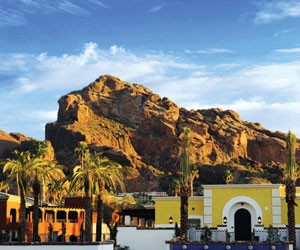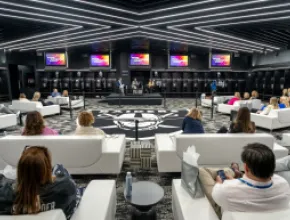Executive retreats have always been a staple in the meetings industry. Gatherings between C-level employees have served as the bread and butter for many luxury properties for years.
But with the industry’s crash of 2009, how are these events faring?
"The events are still happening, but we are dealing with a new reality at this point," says Kari Vrba, vice president, business planning and industry relations for Minneapolis-based Carlson Marketing. "We are waiting to see what happens when the dust settles."
Perception Issues
The "new reality" of executive retreats is a product of perception issues surrounding lavish events.
"Everyone is paying attention," Vrba says, referring to the AIG scandal back in late 2008 and how it has heightened meeting perception issues. "Some clients are more careful about using appropriate destinations. They are making sure that there is a true business reason for having the event."
Cindy Y. Lo, president of Austin, Texas-based Red Velvet Events says she’s seen retreats increasingly scheduled in conjunction with other events.
"Executives need to get away to re-group and collaborate," she says. "They are still having retreats, but instead of making it a separate event, we are seeing them do it in the conference room at their office or scheduling it to piggyback off another event."
Todd Black, president of Orlando-based First Incentive Travel International, says he’s seen a huge change in executive retreats in the past year or so.
"Some people are changing the name of the executive retreat," he says. "They are calling it an executive meeting instead or an executive conference. Even if they are doing the same thing, changing the name certainly sends a different message."
Black says retreats are steering clear of high-end locales.
"Instead of staying at the luxury properties, executives are staying at a hotel that is a little more economical," he says. "They want to send a message to their teams that even executives are cutting back. It is important for company morale.
"When an average employee is struggling and the executive team is still going off and doing a high-end executive retreat, it sends a bad image to the company."
Sean J. Mahoney, president of SITE and vice president of worldwide charter and incentive sales for Fort Lauderdale, Fla.-based Silversea Cruises, has seen the same trend and cited an incident that turned negative perception issues into something positive.
"We had a corporation that chartered a vessel [with Silversea Cruises] and decided to cancel it a month before, even though they were required to pay 100 percent," he says. "The CEO would lay in bed at night having nightmares about his or her program being plastered all over The Wall Street Journal or USA Today. They didn’t want to take that chance.
"They cancelled the program, but donated the entire program to the American Cancer Society," he adds.
Luxury suppliers have felt the pinch of perception issues.
"2009 was a really difficult year," says Greg Hanss, director sales and marketing for the InterContinental Montelucia Resort & Spa in Scottsdale, Ariz. "I’ve been doing this for 22 years and I have never seen anything like 2009.
"We opened in November 2008, just as the air was being let out of the balloon," Hanss continues. "By the time we hit our season, it was a tough environment."
Due to companies wanting to stay low-key, executive retreats have moved closer to home, a trend that has helped some planners.
"Perception issues have hurt us and helped us," Lo says. "It hurt us with existing clients [who usually traveled for executive retreats], but we got some new clients who needed to stay closer to home instead of going out of state."
Logan Chandler, partner at Boston-based Strategic Offsites Group, says the need for executive retreats is still there, but traveling has taken a backseat because of its cost.
"Generally speaking, we have seen a downturn in the amount of off-sites that require executives to fly to outside places," he says.
Vrba says another reason for reductions in travel is because employees are increasingly stretched thin.
"Everyone is busy and there are less people around," she says, adding that she’s seen the length of retreats shorten. "To take them out of the office for any length of time may not be justified."
With shortened meeting lengths have come smaller lead times.
"For most of my career, a 90-day lead has been short," Hanss says, adding that lead times are often much shorter than that these days.
As an example, he cites the fact that the InterContinental Montelucia saw the number of meetings booked for February 2010 double during a 10-day period in January.
Content Changes
With changes in perception have come changes in meeting content.
"It is really all about business this year and last year," Vrba says. "I am seeing more of a business focus verses a team-building component. If you shorten the length of the event, you don’t have time for those things."
Chandler agrees.
"We’ve seen fewer instances of extensive management activities," he says. "We have seen a lot less golf in the afternoon and evening activities are not quite so lavish anymore. Increasingly we have seen retreats as critically important places to do work as opposed to reasons to go have fun or reward the management team with extracurricular activities. I think that shift to a large extent is a function of what is happening externally, with the economic downturn."
Montelucia’s Hanss is witnessing the same trend with his clients.
"I’m seeing less fluff in the schedule," he says. "The former trend of meeting in the morning and recreating in the afternoon is not so common anymore. There is more of a focus on the meetings."
One trend Vrba isn’t seeing much of in executive retreats is the use of virtual technology.
"We are not seeing it in the executive realm," she says. "We haven’t seen it replace our meetings."
Tracking ROI
Just as they are with other meetings, planners of executive retreats are answering to the bottom line.
"All of these programs are increasingly under the microscope," Mahoney says. "Planners are needing to be transparent. They must demonstrate, if not ROI, ROO (return on objectives)."
First Incentive Travel International’s Black concurs.
"ROI and cost savings is huge," he says. "You need to be able to prove your worth."
But, he adds, tracking the ROI of an executive retreat is not easy.
"It is hard to connect ROI to new initiatives from an executive retreat," Black says. "It is much harder than tracking numbers on the sales side. It is easier to provide cost savings on the executive side. For that reason, a lot of executives are not staying at the four-star hotels; they are staying closer to home."
Emerging Trends
Executive retreats may still be occurring, but what trends can we expect in 2010 and beyond?
"I wish I had a crystal ball," Black says. "In 2010, if they are still happening, I think we will see more regional meetings and focused events. In 2011, we will start to see the comeback of executive retreats. They might not be as lavish, but companies may spend more money.
"Companies that didn’t do them at all last year will start to do them again in 2011," he adds. "Companies that really cut back on some of the lavishness will start to increase subtly by going further from home, getting back into the luxury hotel markets."
SITE’s Mahoney also thinks executive retreats will come back next year.
"The general feel is that it won’t happen this year; it will happen next year," he says. "Although I have talked to a lot of people who have hinted that things are returning a little sooner than expected."
Red Velvet Events’ Lo is cautiously optimistic.
"I do feel positive about 2010," she says. "It is on an upswing. Will we ever get back to where we were in 1999 or 2000? I don’t think so."
One new trend to emerge out of the struggling economy is an interest in linking executive retreats with socially responsible activities.
"We’ve had groups donate an afternoon to building houses for Habitat for Humanity rather than going on a jeep tour or a golf outing," says Hanss. "Companies want to be socially responsible, but want to leave a great experience with their attendees."
Regardless of when executive retreats come back on itineraries, Hanss says things will never be the same.
"The complexity of how they [executive retreats] occur has changed forever," he says. "Time efficiency and expense are the number one priorities for the ones who are organizing the events."
—Katie Morell is a Chicago-based freelance writer and former Meetings Media editor.






